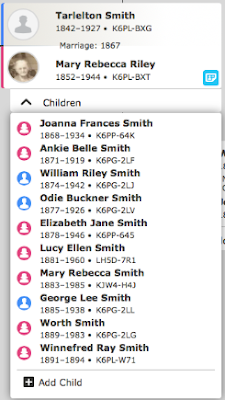In the summer of 1867, Tarleton Smith, 25, a farmer near Owenton, Kentucky, went to town to buy seed. He finished his purchases and as he started to cross the street, he heard approaching hoofbeats on the turnpike. The ride was coming fast, and soon Tarleton saw a girl in a " red saque" streak by, her eyes were intent on the road ahead. She had light brown hair and in the brief time of her approach and passing, Talt saw that the girl was spirited and pretty.
"That's the girl for me, " he said aloud to himself.
He had been waiting for the right girl. He learned that she was Rebecca Riley (Becky), 15, the eldest of the the four daughters of William Riley, Owenton's miller. Riley was a widower. His wife Joanna Hancock Riley, had been dead for twelve years. He had never remarried. The girl's mother, he learned, had died after or during the birth of her fourth child.
Grandma Becky always maintained that her mother, Joanna Hancock, was a descendant of John Hancock, that Boston merchant who grew wealthy from smuggled goods and whose flourishing "John Hancock" is the first name among the signers of the Declaration of Independence.
Talt and Becky Riley were married before the year 1867 was out. About a year later, on October 24, 1868, my mother, Joanna Frances, named after her grandmother, was born. They called her affectionately, Joe.
The only story I recall being told about my mother's childhood in Kentucky, concerns a near-serious accident that happend when she was perhaps three years old. A large fireplace in the front room furnished heat for the Riley's small house. Mama, it seems loved to sit on her chair in front of the fireplace. One evening the 3 year old rocked too hard and toppled into the fire. Before she could be pulled out, her hair was burned, leaving a large bald spot. When I was a child I was fascinated by this story and frequently when Mama finished dressing to go out, she would casually ask me to see if "my bald spot" was showing.
About ten years and three children later, the Tarleton Smiths, like a great number of southern families, left Kentucky to find better farmland out West.
They drove in a wagon to Missouri. Going through Columbia Missouri, where Missouri University was about to celebrate its fortieth year, Becky begged Talt "to setter here" and thus assure a college education for their children.
Unfortunately, her yearning was ignored. None of their ten children, except Joe, was ever to see the inside of a college.
The farm the Talt boughtwash on father west of Columbia in Pittsville, a wide place in the road near rather small town of Holden, Missouri.
From the first, Grandfather Smith was homesick for Kentucky. He wished they had not come to Missouri. Shortly, they "sold out" and returned to Owenton. But five years later, they made the move back again to Missouri, and this time it was permanent.
Seven more children were born: Lucy, Riley, George, Elizabeth, Mary (Maymie) , Worthy, and the baby of the family, Winifred, who died of diphtheria she she was two years old.
The new farm, with the hilltop house and view, was northwest of Holden, and the Smith family became part of that community . They became active in the Baptist church of Holden. Grandma Becky, however, rarely went to church. The children nearly always brought friends home for Sunday dinner which she prepared. Talt attended church, but he was not deeply interested in religion. I at least, never knew him to make any comment about church matters.
Talt though, bought a parlor organ and my mother learned to chord as they gathered around the organ to sing. The young Smiths loved to sing.
My mother recalled that her mother had always subscribed to the Kansas City Star. In the evenings, after Grandmother's long day of work and the children were in bed, she would read the paper often until midnight.
Grandfather had a smokehouse where he hung the hams which he sugar-cured in the Kentucky way. On the east side of th cottage was Grandma's flower bed of multicolored moss-roses. Children, grandchildren and great grandchildren could be found with their parents coming to Grandma's and Grandpa's off and on during the summer.
In the front room of the house Grandfather had hung a large picture of William Jennings Bryan, the repeatedly unsuccessful Democratic candidate for president, whom grandfather repeatedly voted for.
 |
Helen Jo Crissman Life Story, pgs 6-9



